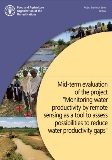WaPOR publications
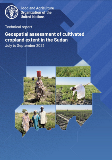
Geospatial assessment of cultivated cropland extent in the Sudan: July to September 2023
21/11/2023
A rapid assessment was conducted in July, August, and September 2023 to estimate the extent of cultivated cropland in Sudan, considering the disruption caused by armed conflict, using geospatial data to inform immediate and long-term food security management.

Implementation of on-farm water management solutions to increase water productivity in Ethiopia
21/12/2021
This technical report focuses on Koga, in Ethiopia, and describes the process of developing, designing, piloting and evaluating potential solutions to increase water productivity sustainably, which is the third objective of component 4 of the WaPOR project. It uses WaPOR data to measure the changes occurring after the implementation of low-cost tools and irrigation practices so as to: increase yield and to reduce the water consumed or applied during the irrigation season.
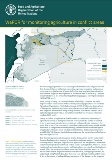
WaPOR for monitoring agriculture in conflict areas
28/12/2020
In periods of conflict, the mechanisms for collecting agricultural data can be disrupted as it might be too unsafe for data to be collected in-situ, or crucial data-collecting infrastructure might be damaged. In such cases, remote sensing data (or earth observations data) can constitute a viable data source to turn to as an alternative or a complement. This case study explores the use of WaPOR data to monitor agricultural activity in conflict areas by focusing on the use of WaPOR data in Syria.
.tmb-th600x450.jpg?Culture=en&sfvrsn=f9ae6da1_2)
WaPOR database methodology- version 2 release (April 2020)
15/09/2020
WaPOR Version 2 was launched in June 2019 based on extensive internal and external validation and quality assessment. This report describes the methodology used to produce the different data components of WaPOR Version 2 at the 250m (Level 1), 100m (Level 2) and 30m (Level 3) resolution, as made available through WaPOR version 2.0 release.
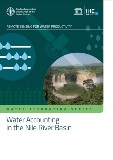
Water accounting in the Nile River Basin
04/08/2020
The Nile River Basin faces a huge challenge in terms of water security. With an expected doubling of the population in the basin in the next twenty-five years, water supply in the basin will be further depleted as demands for agriculture, domestic and industry continues to grow. This report describes the water accounting study for the Nile River Basin carried out by IHE-Delft using the Water Productivity (WaPOR) data portal of the Food and Agricultural Organization (FAO).

Water accounting in the Jordan River Basin
04/06/2020
This report describes the rapid water accounting study for the Jordan River Basin using the Water Productivity (WaPOR) database. The water accounting has been carried out in collaboration with IHE Delft using the FAO Water Productivity (WaPOR) data portal, to gain full insights into the state of the water resources in the basin for the period from 2009 to 2018.
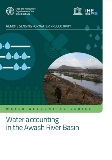
Water accounting in the Awash River Basin
30/04/2020
This report provides the water accounting study for the Awash River Basin in the central Rift Valley of Ethiopia which is experiencing water scarcity. The water accounting has been carried out by IHE Delft using the FAO Water Productivity (WaPOR) data portal, to gain full insights into the state of the water resources in the basin for the period from 2009 to 2018.
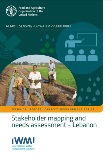
Stakeholder mapping and needs assessment - Lebanon
17/02/2020
This report presents the work undertaken in Lebanon to identify key stakeholders in the agriculture and Information and Communication Technologies (ICT) sector and the capacity needs of farmers to improve water productivity in a sustainable manner.
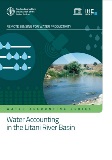
Water Accounting in the Litani River Basin
21/11/2019
This report provides the water accounting study for Litani River basin in Lebanon, one of the key river basins in the country which is experiencing water scarcity. The water accounting has been carried out by IHE Delft using the FAO Water Productivity (WaPOR) data portal, to gain full insights into the state of the water resources in the basin for the period 2010 to 2016.
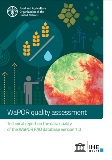
WaPOR quality assessment- Technical report on the data quality of the WaPOR FAO database version 1.0
17/06/2019
This report describes the results of the quality assessment per data layer for each specific theme, as available on the FAO's data portal to monitor Water Productivity through Open access of Remotely sensed derived data (WaPOR 1.0). The quality assessment checks the consistency of the different layers and compares the individual layers to various other independent data sources.
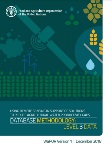
WaPOR v1 database methodology: level 3 data
24/04/2019
This publication describes the methodology applied to produce the different data components made available at Level 3 (30 m spatial resolution) in WaPOR, FAO's portal to monitor Water Productivity through Open access of Remotely sensed derived data.

WaPOR V1 database methodology: level 2 (country and river basin level - 100m)
25/10/2018
This document describes the methodology applied to produce the different data components made available at Level 2 (100 m spatial resolution) in WaPOR, FAO's portal to monitor Water Productivity through Open access of Remotely sensed derived data. The data is mainly derived from freely available remote sensing satellite sensors and products.
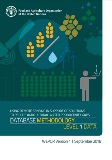
WaPOR V1 - Database methodology: Level 1 data (Continental level - 250m)
21/09/2018
This publication describes the methodology applied to produce the different data components published in WaPOR, FAO's portal to monitor Water Productivity through Open access of Remotely sensed derived data.

Water accounting in the Niger River Basin
01/02/2018
WaPOR Version 2 was launched in June 2019 based on extensive internal and external validation and quality assessment. This report, developed in collaboration with ITC-Twente and the other partner of the FRAME Consortium, provides a quality evaluation of the WaPOR V2 evapotranspiration, biomass and water productivity data across Africa and the Near East, currently distributed through the FAO's WaPOR portal.

WaPOR V2 quality assessment - Technical report on the data quality of the WaPOR FAO database version 2
15/01/2018
WaPOR Version 2 was launched in June 2019 based on extensive internal and external validation and quality assessment. This report, developed in collaboration with ITC-Twente and the other partner of the FRAME Consortium, provides a quality evaluation of the WaPOR V2 evapotranspiration, biomass and water productivity data across Africa and the Near East, currently distributed through the FAO's WaPOR portal.
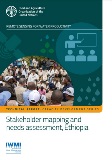
Stakeholder mapping and capacity needs assessment in Koga, Ethiopia
07/09/2017
This document describes the stakeholder analysis and needs assessment carried out by IWMI in WaPOR pilot area in Koga, Ethiopia. The objective is to identify and implement locally appropriate solutions to build capacity to improve water productivity at the scheme level, which can be tested in Ethiopia and out-scaled to the other project locations.

